Back from AWP
About a dozen MFA students and faculty members spent a long weekend in Los Angeles last week for the annual Association of Writers & Writing Programs (AWP) conference. From Wednesday, March 30, through Saturday, April 2, the conference go-ers attended panel discussions about writing, publishing, and teaching, as well as on- and off-site readings and events around downtown LA. West Virginia University Press also coordinated a reading by two of their new authors, Jonathan Corcoran and Jessie van Eerden, whose books have just come out.
MFA students Megan Fahey (left) and Maggie Behringer (right) during a shift at the exhibition table.
Second-year student Whitney Arnold said the Graywolf nonfiction Reading and Conversation panel with authors Geoff Dyer, Leslie Jamison, and Maggie Nelson made the cross-country trek worth it. And professor Glenn Taylor most enjoyed the Hugo House Literary Series All Stars, featuring Jennine Capo Crucet, Natalie Diaz, Roxane Gay, and Jess Walter all reading new work based on a themed prompt. Each author injected the theme with humor, he said, which was a much appreciated interlude.
The English department held a reception at the hotel on Friday night to celebrate fifteen years of WVU’s MFA program, twenty years of the West Virginia Writers’ Workshop, and five years of Cheat River Review. Alums, past English faculty, and newly accepted students were among the many who attended and enjoyed fancy and festive specialty cupcakes.
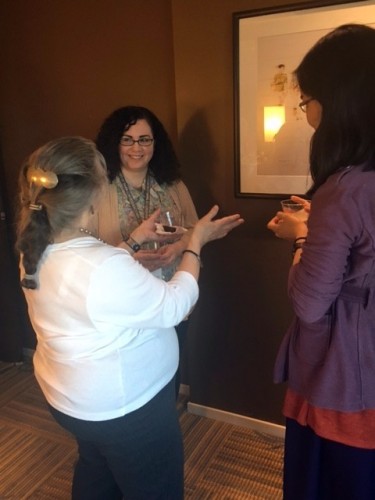
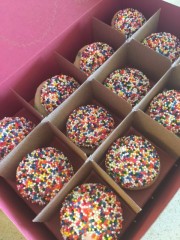

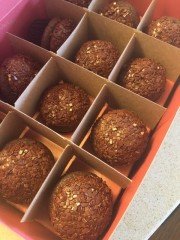
Black Bear Club Reading Series Hosts WVU Affiliated Writers
On Saturday, March 12, as part of their ongoing reading series, Morgantown’s Black Bear Club featured three WVU affiliated writers: Anthony Swofford, SJ Stout, and Mark Brazaitis at 123 Pleasant Street.

Tony Swofford
First up was Tony Swofford, reading a recent nonfiction essay, “On Being Fat: A Physiological Degredation,” which he said he wrote instead of writing what he was supposed to be working on. He surprised and amused the sizeable audience immediately with his opening line, “The first time I was called [fat] by someone I loved . . .” The first someone was an expensive, pedigreed girlfriend who he, to everyone’s surprise, beat in what was supposed to be a fun tennis match at an Italian resort; another was his personal trainer who left him to join the military. Tony is the author of the memoirs Hotels, Hospitals, and Jails and Jarhead, as well as the novel Exit A. He moved to Morgantown last year with his wife, the writer and WVU professor Christa Parravani.
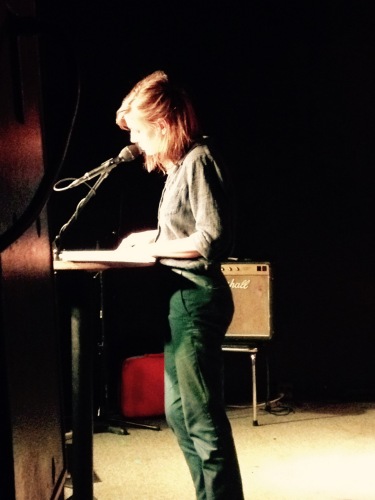
SJ Stout
After a short break for baked goods provided by Brittney Scully, SJ Stout, a first-year MA in literature, won the audience over with poems that were humorous (a sexy dream about Bernie Sanders), poignant (a fawn-shaped hole in her heart), and inaccurate (an epigraph from a sixteenth-century science books that explained how frogs might fall from the sky when their eggs are sucked up into clouds).
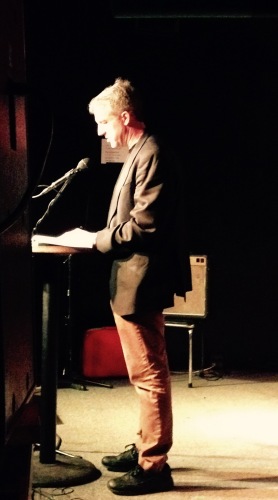
Mark Brazaitis
And finally, to close an excellent evening, Mark Brazaitis, a WVU faculty member in fiction on sabbatical this semester, read “The Eye Man” from his most recent short story collection, Truth Poker. Mark’s story gave us characters who seemed real to life, if a bit extreme—evangelical missionaries in Guatemala helping out a clinic, a undefined116122.undefined116123.undefined116124.undefined116731.undefined213152.doctor who made eyes, a skeptical narrator, a blind boy—pushed to dark edges, but then brought back to show the humorous and redemptive moments possible in the every day.
To keep track of upcoming Black Bear Club events, check them out or friend them on Facebook.
Basketball for Writers
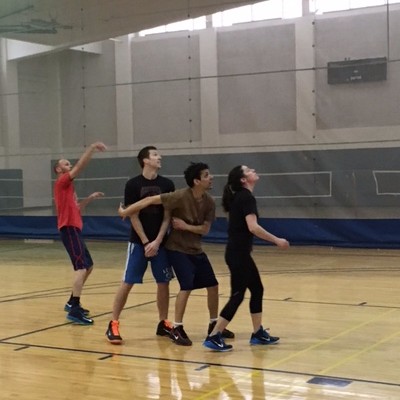
An action shot on a Saturday morning: fiction professor Glenn Taylor takes a shot from the foul line.
For the athletically inclined among the creative writers, Glenn organizes regular basketball games at WVU’s rec center. Often the crew plays 2-on-2, but they’re always looking to expand the teams, and sometimes they’ll play against undergrads who happen to share the court; sometimes the writers even win. Skill is helpful, but enthusiasm is what really counts.
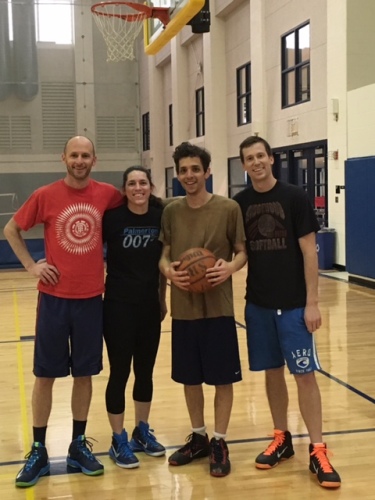
From left to right: Glenn Taylor, Kelsey “English” Englert, Barrett “Feets” Lipkin, and Whitney “Ohio” Arnold
Faculty Reading: Caroline Randall Williams and Christa Parravani
On Leap Day, our two newest creative writing faculty, Caroline Randall Williams and Christa Parravani, read to a full audience in the downtown library’s Robinson Reading Room.
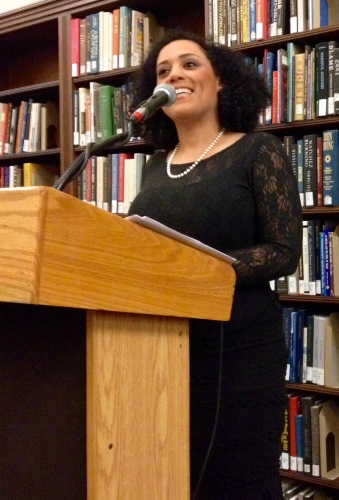
Caroline Randall Williams reading from Lucy Negro, Redux
Caroline Randall Williams, who came to WVU in fall 2015 and read from her 2015 poetry collection Lucy Negro, Redux (Ampersand Books). In the collection, Randall Williams identifies Shakespeare’s “dark lover” through historical documents and imagination and carries that empowered voice across time and place to speak into and out of her own life, declaring, with Shakespeare, that “Beauty herself is black.” She was introduced by second-year MFA Sarah Munroe.
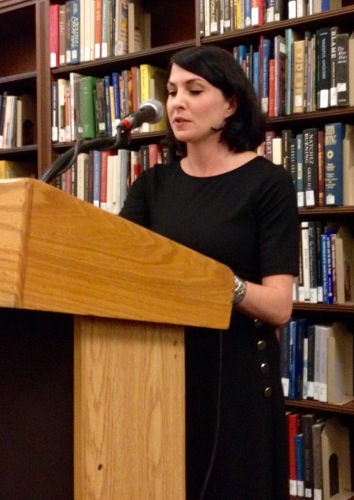
Christa Parravani reading a selection from her next memoir
Christa Parravani also joined WVU’s faculty in fall 2015, in creative nonfiction. She was introduced by second-year MFA Kelsey Englert. Author of Her: A Memoir (Picador, 2013), Parravani read a chapter from her new memoir-in-progress about growing up on a military base. In the selection, a military family picnic turned into a trip to the hospital for Christa. At times funny, at times poignant, and at times a bit frightening, the memoir excerpt allowed a glimpse into Parravani’s young life, her relationship with her twin sister Cara, and the important adults in her life.
You can hear this and many of the program’s other readings at the Creative Readings Podcast hosted by WVU’s Center for Literary Computing.
WVU Art Museum Played Host to the MFA Spring Formal Reading
COW President Andrea Ruggirello giving welcomes and introductions at WVU’s Art Museum for the COW Spring Formal Reading.
The annual Council of Writers (COW) Spring Formal Reading event took place on Wednesday, January 27, in the upstairs gallery of WVU’s new art museum. Writers and the audience gathered in the room’s smaller, featured space, which is now showcasing the paintings of Blanche Lazzell. The WVU alumna, who graduated in 1905, studied avant-garde movements in France, lived and worked at the Provincetown, Massachusetts, artist’s colony, and in the 1930s, created pieces for the Federal Arts Project. Lazzell is credited with introducing abstract styles such as cubism to the WVU School of Art and Design during her brief tenure on faculty.
The MFA program brought its own brand of art to the gallery space. Megan Fahey shared her satirical synesthesia-induced take on sugar. Whit Arnold recalled his sister’s staged robbery of their mother. Bryce Berkowitz channeled both his inner poet and former graffiti artist self. Andrea Ruggirello took the room to Paris’s Pont des Arts bridge and a lover’s lock.
Several others, including Kat Saunders, Jake Maynard, Nat Updike, and Maggie Behringer, read from completed and in-progress work.
Heather Harris, Educational Programs Manager, reached out to COW as part of the museum’s continued effort to connect with students. The museum, which opened in the fall 2015 semester, is located on the Evansdale campus and currently hosts a running series of lunch-time lectures with faculty from the School of Art and Design. For more information about the museum, visit their website: http://artmuseum.wvu.edu/.
Contributed by Maggie Behringer
Undergraduate Creative Writing: Capstone Reading
At the undergraduate level at WVU, students from any major can minor in creative writing. The coursework consists of fifteen credit hours of English classes (beyond the core requirements), which includes reading and writing in fiction, nonfiction, and poetry. English majors who minor in creative writing do a little more: their work culminates in a capstone project in the genre (or a mix of genres) of the author’s choosing.
This fall, Mark Brazaitis taught the 418 capstone course. He, along with graduate-student mentors, worked with eleven undergraduates, workshopping and providing feedback as the students wrote, revised, and prepared their final collections. On Tuesday, December 8, each of the creative writing students read an excerpt from his or her collection after being introduced by his or her mentor. The students’ selections ranged from poignant to humorous and from fantastical to autobiographical, and all were exceptional.
Here’s a taste of their work in the form of a poem/story of sorts created from taking one line from each author in order of appearance:
- Freckles spotted his cheeks and red radiated from his shoulders in standard lifeguard fashion.
- The smell of cologne and cumin hung in the air, which he expected, but also lemon Pledge and flowers.
- Air got trapped in his throat and couldn’t make the trip to his lungs.
- Such denial produces repulsion, naturally.
- With what my days and nights have left me, I am destined to build my own wings.
- I would have given Sandy an extra point in my head if what she had said was true.
- I search for modern music, feet clanging to a tune—I find stairs.
- All I’ve had is one-and-a-half pancakes, and I really need to use the restroom.
- He dare not make another creature from a freestyle. . . . “Perhaps I can make a creature I can write with.”
- Ancestor, would you have picked up that tool if you knew?
Congratulations to the creative writers for completing their capstone and their minor—we look forward to reading your writing in the years to come!
Jacob (Max) Maxwell
mentored by Megan Fahey
Patrick Bush
mentored by Megan Fahey
Sara Burgess
mentored by Whit Arnold
Caleb Milne
mentored by Elizabeth Leo
Ethan Schnell
mentored by Elizabeth Leo
Alan O’Connor
mentored by Kelsey Englert
Joan Conte
mentored by Kelsey Liebenson-Morse
Christopher Henry
mentored by Sarah Munroe
Conar McVicker
mentored by Andrea Ruggirello
Victor Warnock
mentored by Kelsey Englert
You can hear the entire 418 Capstone Reading on the CLC Creative Reading Podcast page: http://literarycomputing.wvu.edu/projects/creative-readings-podcast
A Reading by Sarah Einstein and Kevin Oderman
“It doesn’t happen often, but I think you made the essay worse”—this from long-time WVU professor Kevin Oderman to his MFA student Whitney Arnold last year after seeing Whit’s revisions. Whit relayed this anecdote to a large audience when he introduced Kevin at his reading with former student Sarah Einstein on November 16 in the Robinson Reading Room. But after making this pronouncement, Kevin and Whit went through five rounds of revisions together to make the essay work. And this is what Kevin is known for, this is why he is beloved by students: he reads closely and makes careful line edits; he is dedicated to writing and teaching.
Sarah Einstein acknowledged as much when she took the podium after being introduced by second-year MFA student Kelsey Liebenson-Morse, recognizing Kevin’s help on her manuscript. Sarah, who graduated from WVU’s MFA program in 2011, said that being back at WVU and reading with Kevin felt like sitting at the big people’s table at Thanksgiving.
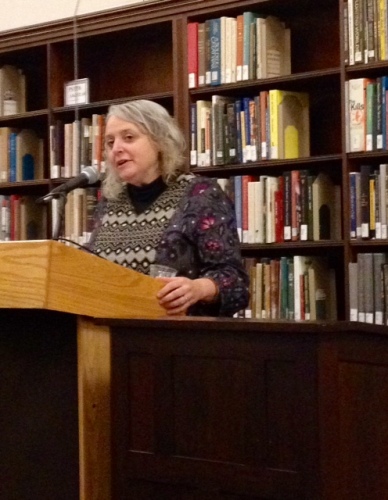
Sarah Einstein
But in terms of writing, Sarah has earned her place at the table: her book Mot: A Memoir won the 2014 AWP Award for Creative Nonfiction and was published this year by the University of Georgia Press. She is a professor of creative writing at the University of Tennessee at Chattanooga. At the reading, she read the first chapter of Mot, “The Nearest Walmart,” in which she drives from West Virginia to Texas to spend a week in a KOA camp with Mot, a schizophrenic homeless man whom she first met in Morgantown. Her complicated friendship with him is relayed in a straightforward, humorous, and compassionate way. Sarah understands that although her times with Mot are in some ways a relief from her regular life, they are also a “remnant of disappointed desire,” reflecting the romance of being Mot’s person to talk to and the lingering hope that maybe one person can change the world.
Kevin read his essay “Selling” from his new collection of twelve essays, Cannot Stay: Essays on Travel, which came out this year from Etruscan Press. Set at a cremation ceremony in Bali, “Selling” is a mediation on faces as signage—what they reveal and what they hide both individually and culturally. In the essay, Kevin reflects on his own face, the way his own signage has always been out of his control, yet even in middle age he has “retained a hopeful sense of becoming” about his face, about looking friendlier. “It helps to have looked at the dead to see how living shows.”
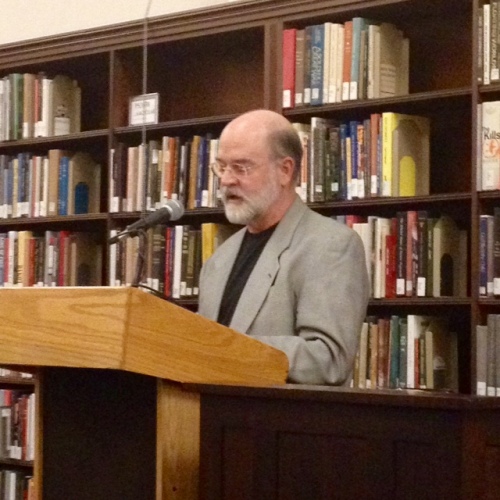
Kevin Oderman
To hear a recording of this reading and other readings from this and previous semesters, visit the Creative Readings Podcast hosted by the Center for Literary Computing.
Storming Morgantown: A Reading with Denise Giardina
West Virginia author Denise Giardina returned to her roots for a reading at 123 Pleasant on Friday, November 6. The reading celebrated all things West Virginia, featuring two additional writers who spent their formative years in Morgantown, Andrea Null and Keegan Lester.
The event was co-sponsored by the Black Bear Club Reading Series and WVU’s English Department. From the Black Bear Club, Howard Parsons kicked off the night by introducing Andrea Null to a room of more than a hundred eager listeners. Andrea is a schoolteacher in Charleston, West Virginia, and her first collection, Common Whores and Midwives is forthcoming. She spoke first of growing up in Morgantown, giving several shout outs to friends and neighbors in the audience. With lively hand gestures and a lilting voice made for storytelling, she read aloud an essay about a man named Homer she’d encountered when she was younger. A final line that captured the heart of the piece: “There is always goodness in the grotesque.”
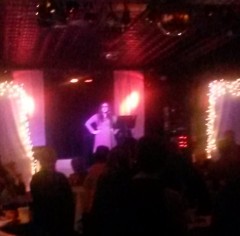
Andrea Null
Next, Howard introduced Keegan Lester, who earned his undergrad degree at WVU and later earned his MFA in Poetry at Columbia University. He currently resides in Brooklyn, New York, but spoke fondly of his time in Morgantown, also calling out to his family and friends in the crowd. He read ten poems, which culminated into a leap off the stage and a venture into the crowd when his microphone stopped working. He shouted the last poem as he wove his way through the people, arms reaching out to slap him on the back, even pausing for a quick hug.
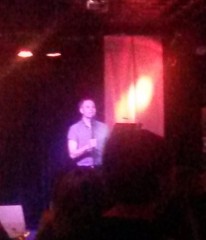
Keegan Lester
The atmosphere was joyful and the crowd was warmed up when the headliner, Denise Giardina, took the stage. Two of Denise’s novels explore the rich history and coal mining industry of West Virginia, bringing life to stories glossed over or not often told. Her work has earned prizes such as the American Book Award and the Boston Book Review fiction prize, and the audience was clearly thrilled to listen to a local author.

Denise Giardina
Wearing a pink cardigan and clutching the pages of her latest manuscript, Denise got right to it. She was going to read something new from a work-in-progress she told an enthusiastic crowd. The excerpt revolved around John W. Davis, a Marine Corps officer who sought to re-marry after his wife died. The audience listened intently to the historical tale and chuckled along afterwards when Denise concluded her reading by asking, “Wasn’t 1910 awful?” The evening was anything but.
Contributed by Andrea Ruggirello
Sturm Writer-in-Residence 2015 Welcomes Susan Straight
Each year in October the English Department invites an author to spend a week at WVU for the Virginia Butts Sturm Writer-in-Residence program. During the week, the author gives a reading and leads workshops with twelve graduate students and one undergraduate who have applied to participate.
This year, we were very pleased to host Susan Straight, author of seven novels and one middle-grade reader. Her novel Highwire Moon was a finalist for the National Book Award in 2001. Straight lives and teaches in Riverside, California, and loves to tell stories about her neighborhood.
WVU faculty member Glenn Taylor first met Straight five years ago at the Miami Book Fair. At an event surrounded by authors and academics, he was happy to find in Susan another writer who could talk tacos and college basketball. What most impressed Glenn, however, was Susan’s loyalty to her daughters, her family, and Riverside.
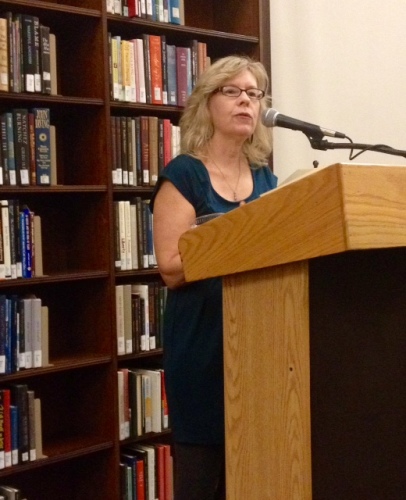
Author Susan Straight reading in the Robinson Reading Room for the 2015 Sturm Writer-in-Residence program on October 15.
Straight’s characters and scenes often pull heavily from people and places she’s seen and known throughout her life, from her brother-in-law to a boy from her daughter’s kindergarten class to a woman working at a linen plant who was deported. “It’s not that we honor or exorcise someone,” Straight explained during the reading, “it’s that we remember them.” But it can take a long time to get these characters right: Straight began writing Highwire Moon at 19 and finished when she was 35. Her book Between Heaven and Here also took 15 years because she had “altogether the wrong thing in my mind about the character.”
Her connection and sense of place helps her to write strong characters. She told her workshop students that she calls writing from this place “Deep Frank”—really getting inside the mind of Frank (or whatever the character’s name is). The place, the scene can also be a character, because geography is destiny: There are people who stay, people who go, and people who come back.
The workshops Susan led on the evenings of October 13, 14, and 16 were focused on the students’ writing: what was on the page, what needed to go, and what needed to be added. One of the most helpful writing tactics Susan employed was asking what was memorable from the story. The things that we remember after reading are the things that the story should be built around. She also stressed finding a reader with whom you share work and honest feedback since graduate school can’t last forever.
On the last night of workshop, Susan delved into publishing, both in literary journals and publishing houses. Her books have come out from a range of publishers, from Hyperion to Anchor to McSweeney’s, and the different types of publishers each offer varying benefits.
This year’s Sturm participants were: Whit Arnold, Margaret Behringer, Bryce Berkowitz, Jordan Carter, Emily Denton, Kelsey Englert, Megan Fahey, Barrett Lipkin, Kelsey Liebenson-Morse, Sarah Munroe, Andrea Ruggirello, Kat Saunders, and Natalie Updike.
To hear Susan Straight’s reading, visit the Creative Readings Podcast hosted by the Center for Literary Computing.
You can watch Susan Straight’s talk, “To Make You Cry: Why I Tell Stories” from TEDx Redondo Beach on YouTube.
Mountain Mann: Writing Appalachian Gay Literature, a Reading by Jeff Mann

Visiting author and WVU alum Jeff Mann (left) was introduced by long-time friend and WVU professor Kevin Oderman (right)
Jeff Mann was born in Appalachia and means to die in Appalachia. Most gay literature depicts a “Big Gay life in a Big Gay city,” but Mann’s life’s work shows a different world: From Hinton, West Virginia, he was a young, gay man who stayed rather than leaving for an easier place. Those experiences are at the heart of his poems, essays, and fiction.
When he was seventeen, Mann came to WVU to study English and forestry, and today he teaches creative writing at Virginia Tech. Mann’s reading on October 7—held in the Gluck Theatre in the Mountainlair and presented by the WVU Office of Multicultural Programs in partnership with WVU Spectrum was filled with stories of his time in Morgantown as well as histories of Appalachia.
Mann read from his 2015 poem collection, Rebels, in which he overlaps Civil War history and locations with his own life and history. One of his poems features a bakery in Shepherdstown, West Virginia, housed in a building that once served as part of the hospital where soldiers from the Battle of Antietam were cared for. Mann’s poem poignantly invokes the past and present, imagining the largely repressed history of gay men during that era in a space that now makes delicious donuts.
And because he was back in Morgantown, Mann read “715 Willey Street”—which recounts his experience in Morgantown in 1977 as a gay undergrad—from his 2010 essay collection, Binding the God. In the essay he dances with friends and roommates (and a chicken they were preparing to roast). Mann told the audience that what he misses most about his young, gay days is the dancing: Now, he dances in his basement to Melissa Etheridge while lifting weights.

 Feed
Feed